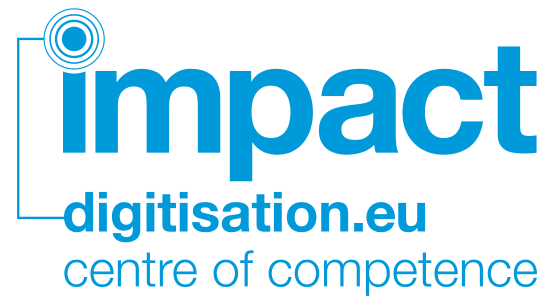Following the DATeCH 4th session and the round table (20 May), a panel session to discuss hot topics about digitisation was chaired by Milagros del Corral (International Organizations Advisor and Chair of the Succeed Expert Advisory Board). The panel also involved some members of the Succeed EAB, Jill Cousins (Europeana), Steven Krawer (Utrecht University) and Michael Keller (Stanford University Library) in addition to Giuseppe Abbamonte, Director of Media and Data (DG CONNECT) of the European Commission.
The session was opened with an overview when Jill Cousins presented the Europeana strategic plan for 2014-2020. She recalled the still minor fraction of the cultural heritage which has been already been digitized in Europe (about 10% of the total) and stressed the importance of making this content reusable and recommended focusing on quality, not only in quantity for better reusability. As an example of such practices, Jill highlighted the Rijksmuseum.
Later, Milagros del Corral launched the first question to the participants: Should we move the focus more into quality or into quantity? Steven Krauwer, from a researcher’s point of view, explained that “we need to resist the temptation to go for volume”, while Michael Keller distinguished between “documents that make it possible to understand the national entity, culture, etc., which need more digitisation with a sufficient quality”, and documents digitized by private institutions, in which “the high quality is terribly important.”
Milagros del Corral moved the debate to a new question: The business model: How to fund

The Succeed Expert Advisory Board and Giuseppe Abbamonte during the panel session: The digitisation of cultural heritage: modern utopia?
all these exercises, including preservation. In this point, the participants had slightly different points of view. According to Giuseppe Abbamonte, the hardware needed for digitisation is available on the market at low prices. In addition, companies, can play a very important role by sponsoring digitisation and of course, also the Member States.
Steven Krauwer stated, as a researcher, that public funding is needed for digitisation and he claimed that there is a commercial potential in the digitisation of cultural heritage and the European Union must therefore view digitisation as an opportunity. There should thus be incentives for companies and universities to work together and invest in digitisations.
Jill Cousins suggested a model in which people using the content pay for its digitisation. In this respect, Michael Keller gave the example of the Mathew Parker library of the Stanford University, where the content is freely available in low resolution and users can pay for a higher quality version. These fees allow the library to improve the content. Michael Keller stressed that this model has received several criticisms, but no alternative business model was proposed.
Milagros del Corral stated that the model of universities in the United States is quite different to that of the public universities in Europe, where people believe that once they have paid taxes that sustained these universities, they should not need to pay for extra services.
Giuseppe Abbamonte, highlighted copyright as one of the most important barriers for digitisation in Europe.
After the discussion on the business models, a final question was raised, New usages: requirements and needs. Steven Krauwer pointed out that researchers of History or Social Sciences are not aware of their needs regarding the usage of digital content, and he noted that we need to make an effort to educate them as regards the potential usages of digital content. Michael Keller mentioned, as examples, several projects that the University of Stanford is undertaking in this field.
Milagros del Corral then ceded the floor to some attendees to collect new points of view on the issues discussed. Some attendees raised questions such as the need to provide open access to open data, the fact that the EU is moving the target from creating content to reusing content and the need for a central policy establishing which documents have priority in the digitisation of the 90% of cultural heritage that is still to be digitised.
The session was closed by Giuseppe Abbamonte, who presented the EC point of view of the situation of the digitisation of the cultural heritage in Europe, focusing on museums. He stated that there is no reason for not providing high quality content since the hardware needed is available at low prices on the market. In addition, he noted that the EC provides EC countries with regional funds , and in Spain for example, about 1% of these funds are spent on culture.
You can see the full video of the panel session here:
[cvm_playlist theme=”default” aspect_ratio=”4×3″ width=”640″ volume=”30″ videos=”2029″]


